Contemporary Tourism: Economic, Environmental & Socio-Cultural Impacts
VerifiedAdded on 2023/06/14
|8
|2448
|83
Essay
AI Summary
This essay delves into the evolution of contemporary tourism, examining its positive and negative impacts across economic, environmental, and socio-cultural dimensions. It highlights tourism's role in economic growth, job creation, and revenue generation for nations, while also acknowledging the potential for increased prices and over-dependency. The analysis extends to environmental consequences, such as pollution and ecosystem damage, alongside socio-cultural effects, including cultural exchange and potential conflicts. The essay concludes by emphasizing the need for sustainable practices to mitigate negative impacts and promote responsible tourism development, urging both government and citizens to prioritize environmental preservation and cultural sensitivity.
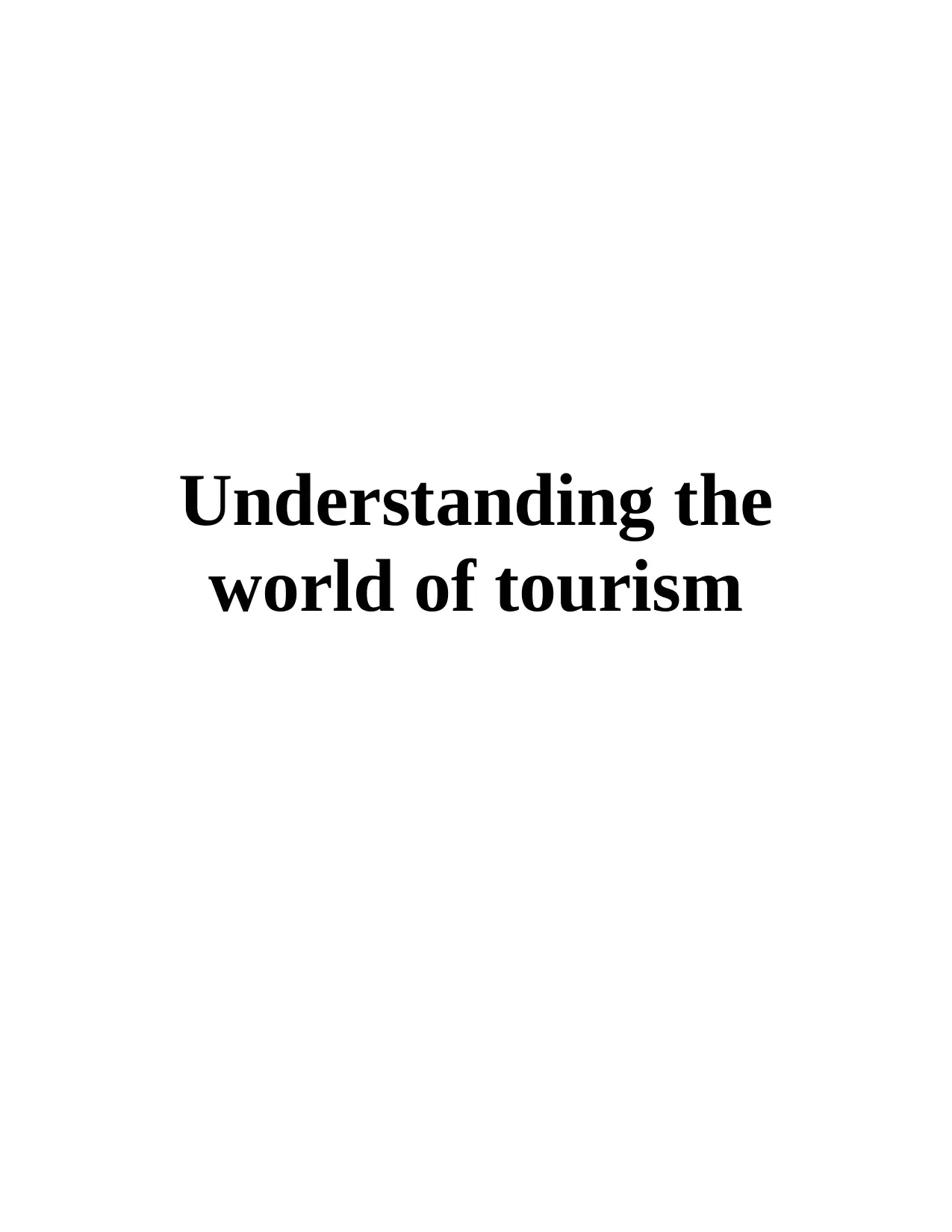
Understanding the
world of tourism
world of tourism
Paraphrase This Document
Need a fresh take? Get an instant paraphrase of this document with our AI Paraphraser
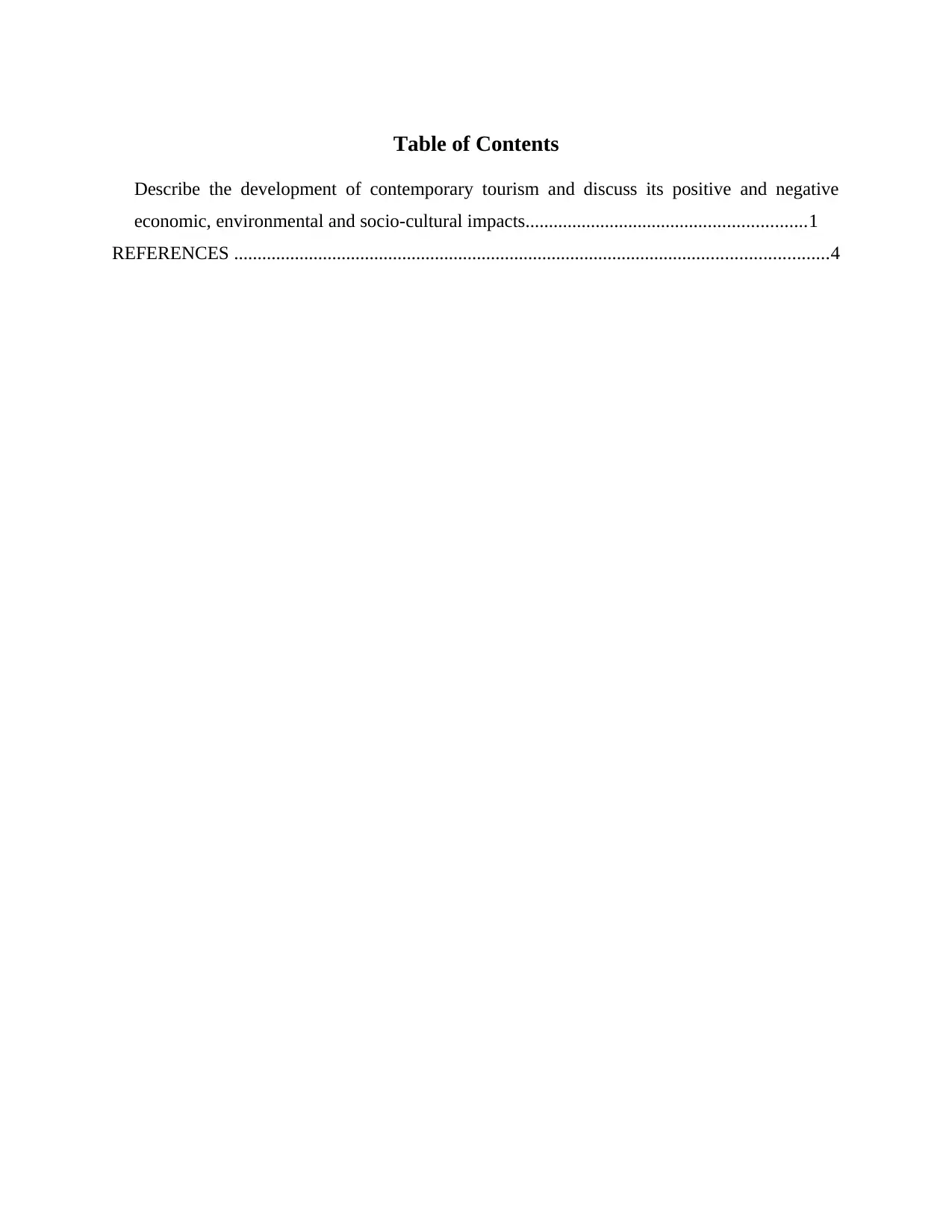
Table of Contents
Describe the development of contemporary tourism and discuss its positive and negative
economic, environmental and socio-cultural impacts............................................................1
REFERENCES ...............................................................................................................................4
Describe the development of contemporary tourism and discuss its positive and negative
economic, environmental and socio-cultural impacts............................................................1
REFERENCES ...............................................................................................................................4
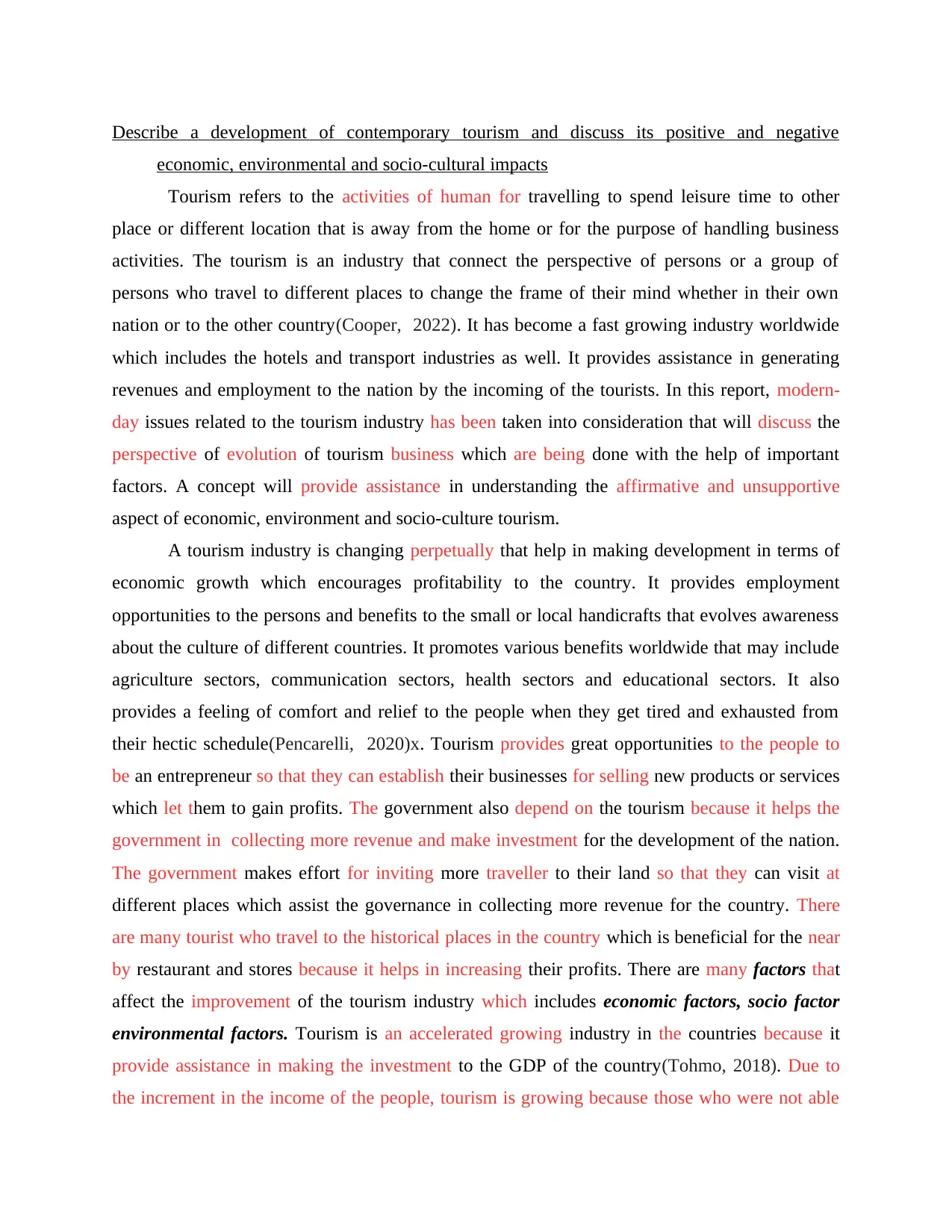
Describe a development of contemporary tourism and discuss its positive and negative
economic, environmental and socio-cultural impacts
Tourism refers to the activities of human for travelling to spend leisure time to other
place or different location that is away from the home or for the purpose of handling business
activities. The tourism is an industry that connect the perspective of persons or a group of
persons who travel to different places to change the frame of their mind whether in their own
nation or to the other country(Cooper, 2022). It has become a fast growing industry worldwide
which includes the hotels and transport industries as well. It provides assistance in generating
revenues and employment to the nation by the incoming of the tourists. In this report, modern-
day issues related to the tourism industry has been taken into consideration that will discuss the
perspective of evolution of tourism business which are being done with the help of important
factors. A concept will provide assistance in understanding the affirmative and unsupportive
aspect of economic, environment and socio-culture tourism.
A tourism industry is changing perpetually that help in making development in terms of
economic growth which encourages profitability to the country. It provides employment
opportunities to the persons and benefits to the small or local handicrafts that evolves awareness
about the culture of different countries. It promotes various benefits worldwide that may include
agriculture sectors, communication sectors, health sectors and educational sectors. It also
provides a feeling of comfort and relief to the people when they get tired and exhausted from
their hectic schedule(Pencarelli, 2020)x. Tourism provides great opportunities to the people to
be an entrepreneur so that they can establish their businesses for selling new products or services
which let them to gain profits. The government also depend on the tourism because it helps the
government in collecting more revenue and make investment for the development of the nation.
The government makes effort for inviting more traveller to their land so that they can visit at
different places which assist the governance in collecting more revenue for the country. There
are many tourist who travel to the historical places in the country which is beneficial for the near
by restaurant and stores because it helps in increasing their profits. There are many factors that
affect the improvement of the tourism industry which includes economic factors, socio factor
environmental factors. Tourism is an accelerated growing industry in the countries because it
provide assistance in making the investment to the GDP of the country(Tohmo, 2018). Due to
the increment in the income of the people, tourism is growing because those who were not able
economic, environmental and socio-cultural impacts
Tourism refers to the activities of human for travelling to spend leisure time to other
place or different location that is away from the home or for the purpose of handling business
activities. The tourism is an industry that connect the perspective of persons or a group of
persons who travel to different places to change the frame of their mind whether in their own
nation or to the other country(Cooper, 2022). It has become a fast growing industry worldwide
which includes the hotels and transport industries as well. It provides assistance in generating
revenues and employment to the nation by the incoming of the tourists. In this report, modern-
day issues related to the tourism industry has been taken into consideration that will discuss the
perspective of evolution of tourism business which are being done with the help of important
factors. A concept will provide assistance in understanding the affirmative and unsupportive
aspect of economic, environment and socio-culture tourism.
A tourism industry is changing perpetually that help in making development in terms of
economic growth which encourages profitability to the country. It provides employment
opportunities to the persons and benefits to the small or local handicrafts that evolves awareness
about the culture of different countries. It promotes various benefits worldwide that may include
agriculture sectors, communication sectors, health sectors and educational sectors. It also
provides a feeling of comfort and relief to the people when they get tired and exhausted from
their hectic schedule(Pencarelli, 2020)x. Tourism provides great opportunities to the people to
be an entrepreneur so that they can establish their businesses for selling new products or services
which let them to gain profits. The government also depend on the tourism because it helps the
government in collecting more revenue and make investment for the development of the nation.
The government makes effort for inviting more traveller to their land so that they can visit at
different places which assist the governance in collecting more revenue for the country. There
are many tourist who travel to the historical places in the country which is beneficial for the near
by restaurant and stores because it helps in increasing their profits. There are many factors that
affect the improvement of the tourism industry which includes economic factors, socio factor
environmental factors. Tourism is an accelerated growing industry in the countries because it
provide assistance in making the investment to the GDP of the country(Tohmo, 2018). Due to
the increment in the income of the people, tourism is growing because those who were not able
⊘ This is a preview!⊘
Do you want full access?
Subscribe today to unlock all pages.

Trusted by 1+ million students worldwide
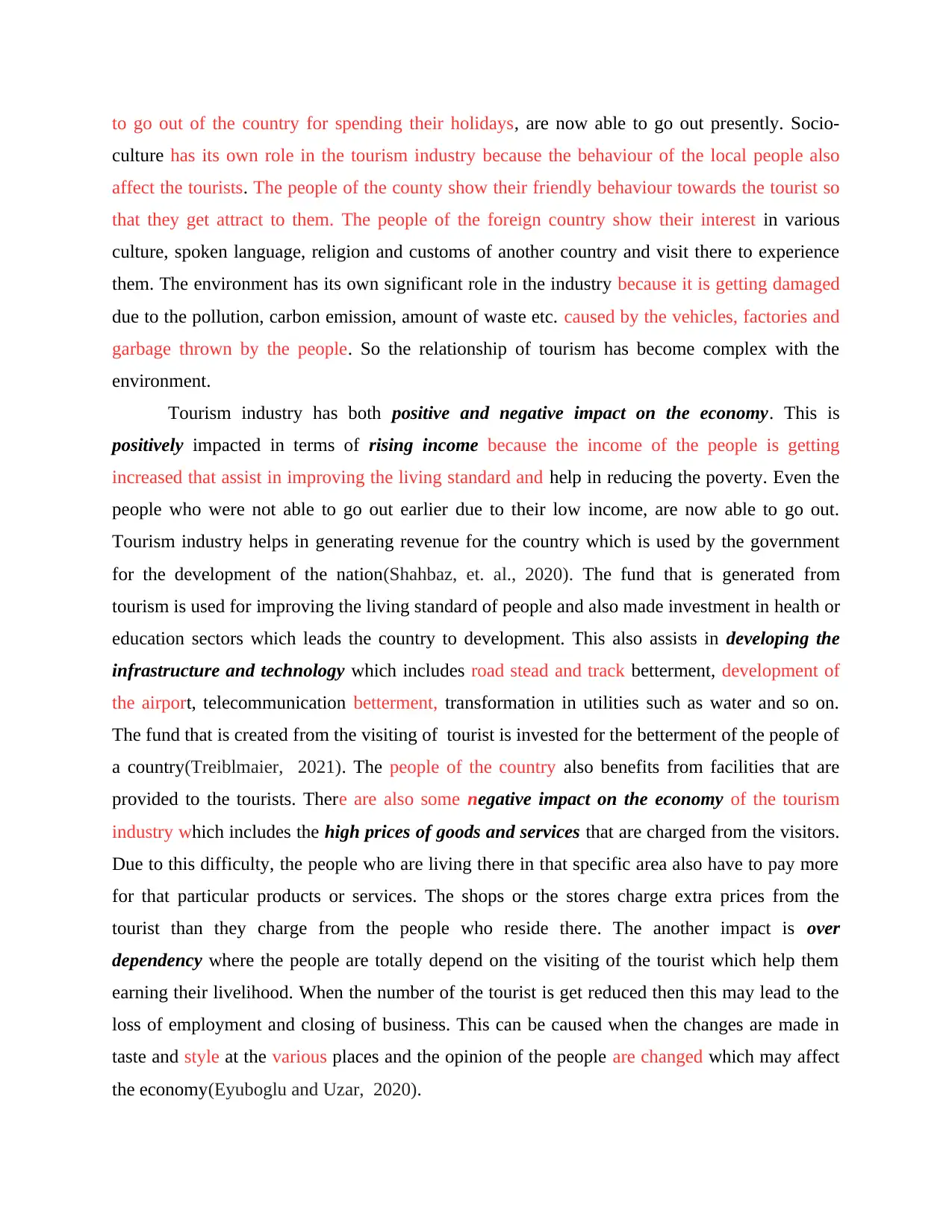
to go out of the country for spending their holidays, are now able to go out presently. Socio-
culture has its own role in the tourism industry because the behaviour of the local people also
affect the tourists. The people of the county show their friendly behaviour towards the tourist so
that they get attract to them. The people of the foreign country show their interest in various
culture, spoken language, religion and customs of another country and visit there to experience
them. The environment has its own significant role in the industry because it is getting damaged
due to the pollution, carbon emission, amount of waste etc. caused by the vehicles, factories and
garbage thrown by the people. So the relationship of tourism has become complex with the
environment.
Tourism industry has both positive and negative impact on the economy. This is
positively impacted in terms of rising income because the income of the people is getting
increased that assist in improving the living standard and help in reducing the poverty. Even the
people who were not able to go out earlier due to their low income, are now able to go out.
Tourism industry helps in generating revenue for the country which is used by the government
for the development of the nation(Shahbaz, et. al., 2020). The fund that is generated from
tourism is used for improving the living standard of people and also made investment in health or
education sectors which leads the country to development. This also assists in developing the
infrastructure and technology which includes road stead and track betterment, development of
the airport, telecommunication betterment, transformation in utilities such as water and so on.
The fund that is created from the visiting of tourist is invested for the betterment of the people of
a country(Treiblmaier, 2021). The people of the country also benefits from facilities that are
provided to the tourists. There are also some negative impact on the economy of the tourism
industry which includes the high prices of goods and services that are charged from the visitors.
Due to this difficulty, the people who are living there in that specific area also have to pay more
for that particular products or services. The shops or the stores charge extra prices from the
tourist than they charge from the people who reside there. The another impact is over
dependency where the people are totally depend on the visiting of the tourist which help them
earning their livelihood. When the number of the tourist is get reduced then this may lead to the
loss of employment and closing of business. This can be caused when the changes are made in
taste and style at the various places and the opinion of the people are changed which may affect
the economy(Eyuboglu and Uzar, 2020).
culture has its own role in the tourism industry because the behaviour of the local people also
affect the tourists. The people of the county show their friendly behaviour towards the tourist so
that they get attract to them. The people of the foreign country show their interest in various
culture, spoken language, religion and customs of another country and visit there to experience
them. The environment has its own significant role in the industry because it is getting damaged
due to the pollution, carbon emission, amount of waste etc. caused by the vehicles, factories and
garbage thrown by the people. So the relationship of tourism has become complex with the
environment.
Tourism industry has both positive and negative impact on the economy. This is
positively impacted in terms of rising income because the income of the people is getting
increased that assist in improving the living standard and help in reducing the poverty. Even the
people who were not able to go out earlier due to their low income, are now able to go out.
Tourism industry helps in generating revenue for the country which is used by the government
for the development of the nation(Shahbaz, et. al., 2020). The fund that is generated from
tourism is used for improving the living standard of people and also made investment in health or
education sectors which leads the country to development. This also assists in developing the
infrastructure and technology which includes road stead and track betterment, development of
the airport, telecommunication betterment, transformation in utilities such as water and so on.
The fund that is created from the visiting of tourist is invested for the betterment of the people of
a country(Treiblmaier, 2021). The people of the country also benefits from facilities that are
provided to the tourists. There are also some negative impact on the economy of the tourism
industry which includes the high prices of goods and services that are charged from the visitors.
Due to this difficulty, the people who are living there in that specific area also have to pay more
for that particular products or services. The shops or the stores charge extra prices from the
tourist than they charge from the people who reside there. The another impact is over
dependency where the people are totally depend on the visiting of the tourist which help them
earning their livelihood. When the number of the tourist is get reduced then this may lead to the
loss of employment and closing of business. This can be caused when the changes are made in
taste and style at the various places and the opinion of the people are changed which may affect
the economy(Eyuboglu and Uzar, 2020).
Paraphrase This Document
Need a fresh take? Get an instant paraphrase of this document with our AI Paraphraser
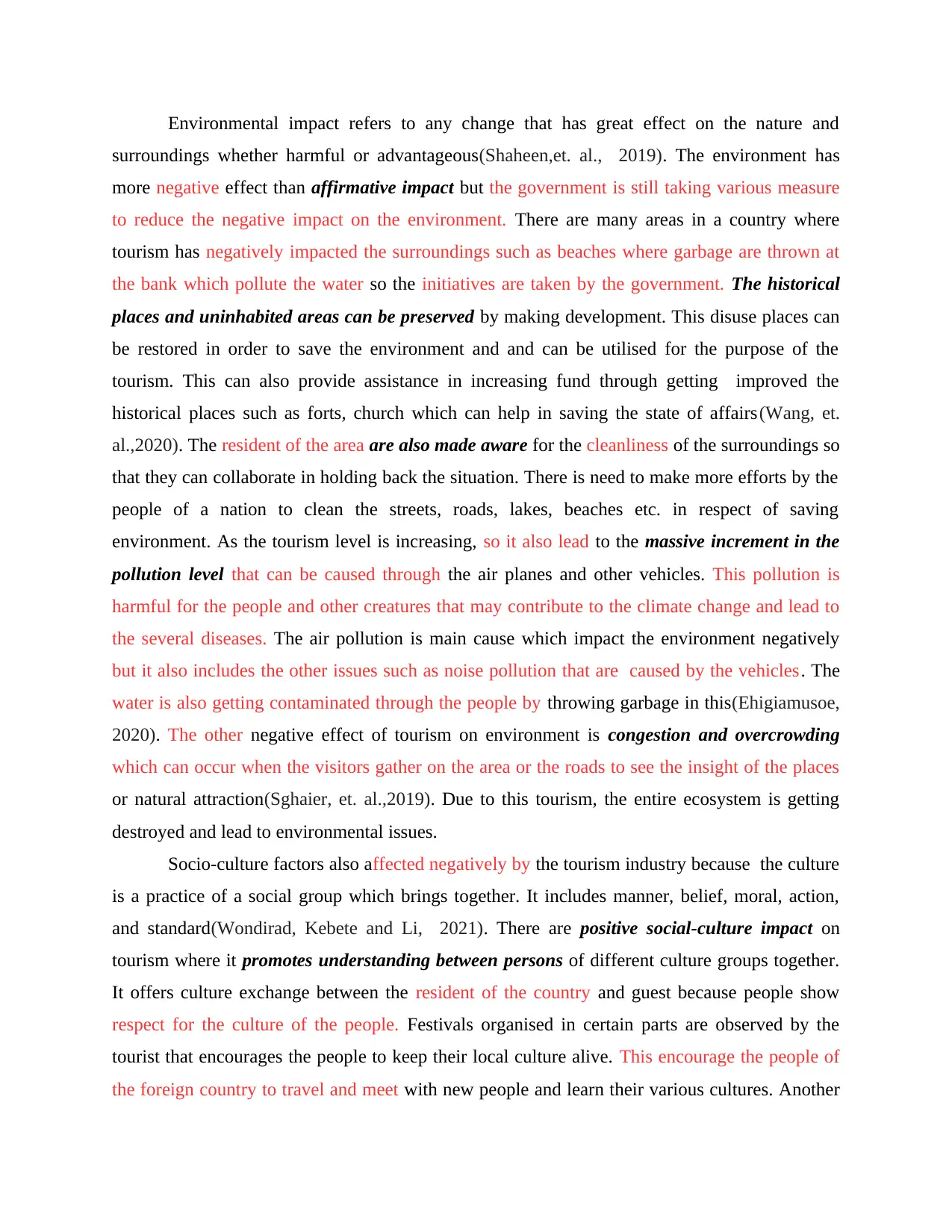
Environmental impact refers to any change that has great effect on the nature and
surroundings whether harmful or advantageous(Shaheen,et. al., 2019). The environment has
more negative effect than affirmative impact but the government is still taking various measure
to reduce the negative impact on the environment. There are many areas in a country where
tourism has negatively impacted the surroundings such as beaches where garbage are thrown at
the bank which pollute the water so the initiatives are taken by the government. The historical
places and uninhabited areas can be preserved by making development. This disuse places can
be restored in order to save the environment and and can be utilised for the purpose of the
tourism. This can also provide assistance in increasing fund through getting improved the
historical places such as forts, church which can help in saving the state of affairs(Wang, et.
al.,2020). The resident of the area are also made aware for the cleanliness of the surroundings so
that they can collaborate in holding back the situation. There is need to make more efforts by the
people of a nation to clean the streets, roads, lakes, beaches etc. in respect of saving
environment. As the tourism level is increasing, so it also lead to the massive increment in the
pollution level that can be caused through the air planes and other vehicles. This pollution is
harmful for the people and other creatures that may contribute to the climate change and lead to
the several diseases. The air pollution is main cause which impact the environment negatively
but it also includes the other issues such as noise pollution that are caused by the vehicles. The
water is also getting contaminated through the people by throwing garbage in this(Ehigiamusoe,
2020). The other negative effect of tourism on environment is congestion and overcrowding
which can occur when the visitors gather on the area or the roads to see the insight of the places
or natural attraction(Sghaier, et. al.,2019). Due to this tourism, the entire ecosystem is getting
destroyed and lead to environmental issues.
Socio-culture factors also affected negatively by the tourism industry because the culture
is a practice of a social group which brings together. It includes manner, belief, moral, action,
and standard(Wondirad, Kebete and Li, 2021). There are positive social-culture impact on
tourism where it promotes understanding between persons of different culture groups together.
It offers culture exchange between the resident of the country and guest because people show
respect for the culture of the people. Festivals organised in certain parts are observed by the
tourist that encourages the people to keep their local culture alive. This encourage the people of
the foreign country to travel and meet with new people and learn their various cultures. Another
surroundings whether harmful or advantageous(Shaheen,et. al., 2019). The environment has
more negative effect than affirmative impact but the government is still taking various measure
to reduce the negative impact on the environment. There are many areas in a country where
tourism has negatively impacted the surroundings such as beaches where garbage are thrown at
the bank which pollute the water so the initiatives are taken by the government. The historical
places and uninhabited areas can be preserved by making development. This disuse places can
be restored in order to save the environment and and can be utilised for the purpose of the
tourism. This can also provide assistance in increasing fund through getting improved the
historical places such as forts, church which can help in saving the state of affairs(Wang, et.
al.,2020). The resident of the area are also made aware for the cleanliness of the surroundings so
that they can collaborate in holding back the situation. There is need to make more efforts by the
people of a nation to clean the streets, roads, lakes, beaches etc. in respect of saving
environment. As the tourism level is increasing, so it also lead to the massive increment in the
pollution level that can be caused through the air planes and other vehicles. This pollution is
harmful for the people and other creatures that may contribute to the climate change and lead to
the several diseases. The air pollution is main cause which impact the environment negatively
but it also includes the other issues such as noise pollution that are caused by the vehicles. The
water is also getting contaminated through the people by throwing garbage in this(Ehigiamusoe,
2020). The other negative effect of tourism on environment is congestion and overcrowding
which can occur when the visitors gather on the area or the roads to see the insight of the places
or natural attraction(Sghaier, et. al.,2019). Due to this tourism, the entire ecosystem is getting
destroyed and lead to environmental issues.
Socio-culture factors also affected negatively by the tourism industry because the culture
is a practice of a social group which brings together. It includes manner, belief, moral, action,
and standard(Wondirad, Kebete and Li, 2021). There are positive social-culture impact on
tourism where it promotes understanding between persons of different culture groups together.
It offers culture exchange between the resident of the country and guest because people show
respect for the culture of the people. Festivals organised in certain parts are observed by the
tourist that encourages the people to keep their local culture alive. This encourage the people of
the foreign country to travel and meet with new people and learn their various cultures. Another
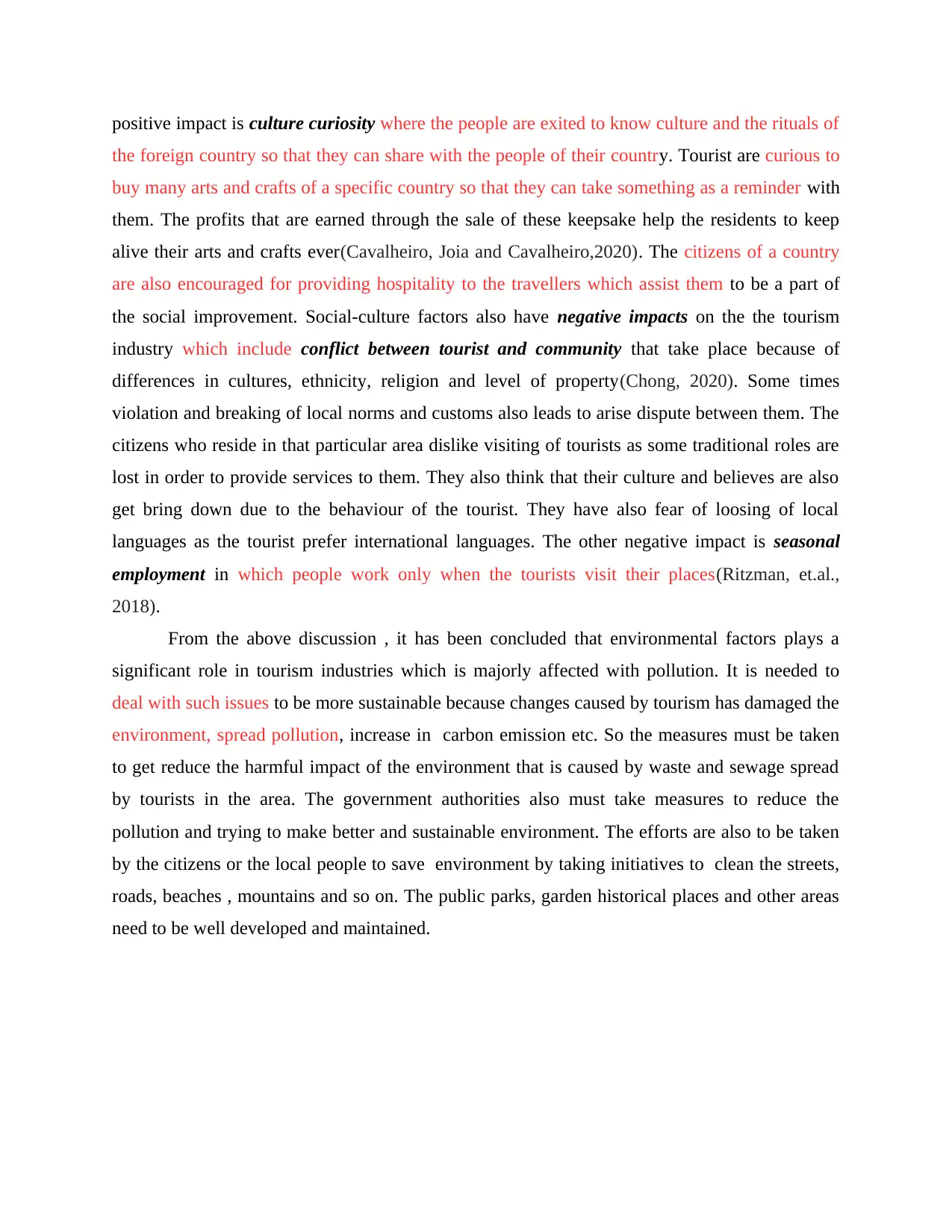
positive impact is culture curiosity where the people are exited to know culture and the rituals of
the foreign country so that they can share with the people of their country. Tourist are curious to
buy many arts and crafts of a specific country so that they can take something as a reminder with
them. The profits that are earned through the sale of these keepsake help the residents to keep
alive their arts and crafts ever(Cavalheiro, Joia and Cavalheiro,2020). The citizens of a country
are also encouraged for providing hospitality to the travellers which assist them to be a part of
the social improvement. Social-culture factors also have negative impacts on the the tourism
industry which include conflict between tourist and community that take place because of
differences in cultures, ethnicity, religion and level of property(Chong, 2020). Some times
violation and breaking of local norms and customs also leads to arise dispute between them. The
citizens who reside in that particular area dislike visiting of tourists as some traditional roles are
lost in order to provide services to them. They also think that their culture and believes are also
get bring down due to the behaviour of the tourist. They have also fear of loosing of local
languages as the tourist prefer international languages. The other negative impact is seasonal
employment in which people work only when the tourists visit their places(Ritzman, et.al.,
2018).
From the above discussion , it has been concluded that environmental factors plays a
significant role in tourism industries which is majorly affected with pollution. It is needed to
deal with such issues to be more sustainable because changes caused by tourism has damaged the
environment, spread pollution, increase in carbon emission etc. So the measures must be taken
to get reduce the harmful impact of the environment that is caused by waste and sewage spread
by tourists in the area. The government authorities also must take measures to reduce the
pollution and trying to make better and sustainable environment. The efforts are also to be taken
by the citizens or the local people to save environment by taking initiatives to clean the streets,
roads, beaches , mountains and so on. The public parks, garden historical places and other areas
need to be well developed and maintained.
the foreign country so that they can share with the people of their country. Tourist are curious to
buy many arts and crafts of a specific country so that they can take something as a reminder with
them. The profits that are earned through the sale of these keepsake help the residents to keep
alive their arts and crafts ever(Cavalheiro, Joia and Cavalheiro,2020). The citizens of a country
are also encouraged for providing hospitality to the travellers which assist them to be a part of
the social improvement. Social-culture factors also have negative impacts on the the tourism
industry which include conflict between tourist and community that take place because of
differences in cultures, ethnicity, religion and level of property(Chong, 2020). Some times
violation and breaking of local norms and customs also leads to arise dispute between them. The
citizens who reside in that particular area dislike visiting of tourists as some traditional roles are
lost in order to provide services to them. They also think that their culture and believes are also
get bring down due to the behaviour of the tourist. They have also fear of loosing of local
languages as the tourist prefer international languages. The other negative impact is seasonal
employment in which people work only when the tourists visit their places(Ritzman, et.al.,
2018).
From the above discussion , it has been concluded that environmental factors plays a
significant role in tourism industries which is majorly affected with pollution. It is needed to
deal with such issues to be more sustainable because changes caused by tourism has damaged the
environment, spread pollution, increase in carbon emission etc. So the measures must be taken
to get reduce the harmful impact of the environment that is caused by waste and sewage spread
by tourists in the area. The government authorities also must take measures to reduce the
pollution and trying to make better and sustainable environment. The efforts are also to be taken
by the citizens or the local people to save environment by taking initiatives to clean the streets,
roads, beaches , mountains and so on. The public parks, garden historical places and other areas
need to be well developed and maintained.
⊘ This is a preview!⊘
Do you want full access?
Subscribe today to unlock all pages.

Trusted by 1+ million students worldwide
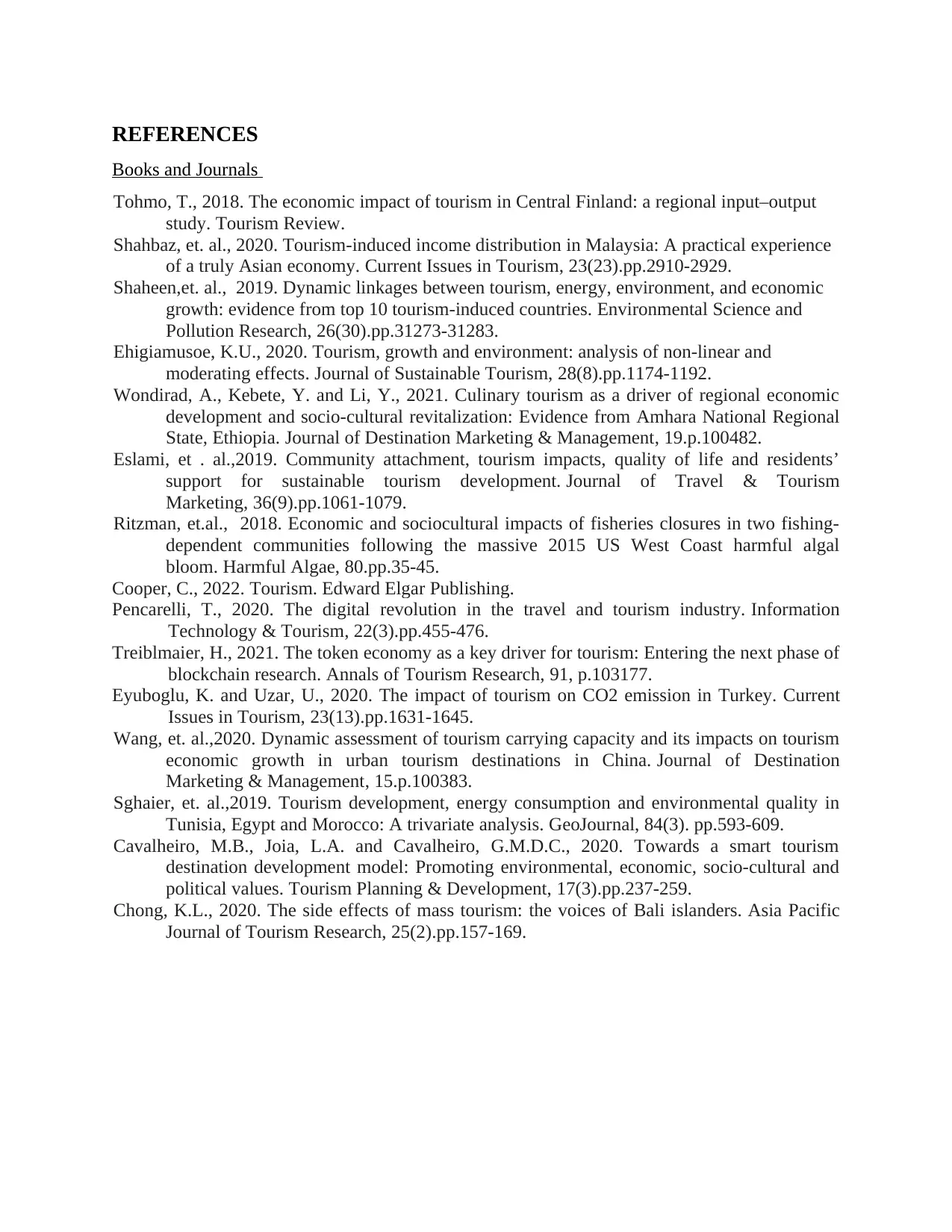
REFERENCES
Books and Journals
Tohmo, T., 2018. The economic impact of tourism in Central Finland: a regional input–output
study. Tourism Review.
Shahbaz, et. al., 2020. Tourism-induced income distribution in Malaysia: A practical experience
of a truly Asian economy. Current Issues in Tourism, 23(23).pp.2910-2929.
Shaheen,et. al., 2019. Dynamic linkages between tourism, energy, environment, and economic
growth: evidence from top 10 tourism-induced countries. Environmental Science and
Pollution Research, 26(30).pp.31273-31283.
Ehigiamusoe, K.U., 2020. Tourism, growth and environment: analysis of non-linear and
moderating effects. Journal of Sustainable Tourism, 28(8).pp.1174-1192.
Wondirad, A., Kebete, Y. and Li, Y., 2021. Culinary tourism as a driver of regional economic
development and socio-cultural revitalization: Evidence from Amhara National Regional
State, Ethiopia. Journal of Destination Marketing & Management, 19.p.100482.
Eslami, et . al.,2019. Community attachment, tourism impacts, quality of life and residents’
support for sustainable tourism development. Journal of Travel & Tourism
Marketing, 36(9).pp.1061-1079.
Ritzman, et.al., 2018. Economic and sociocultural impacts of fisheries closures in two fishing-
dependent communities following the massive 2015 US West Coast harmful algal
bloom. Harmful Algae, 80.pp.35-45.
Cooper, C., 2022. Tourism. Edward Elgar Publishing.
Pencarelli, T., 2020. The digital revolution in the travel and tourism industry. Information
Technology & Tourism, 22(3).pp.455-476.
Treiblmaier, H., 2021. The token economy as a key driver for tourism: Entering the next phase of
blockchain research. Annals of Tourism Research, 91, p.103177.
Eyuboglu, K. and Uzar, U., 2020. The impact of tourism on CO2 emission in Turkey. Current
Issues in Tourism, 23(13).pp.1631-1645.
Wang, et. al.,2020. Dynamic assessment of tourism carrying capacity and its impacts on tourism
economic growth in urban tourism destinations in China. Journal of Destination
Marketing & Management, 15.p.100383.
Sghaier, et. al.,2019. Tourism development, energy consumption and environmental quality in
Tunisia, Egypt and Morocco: A trivariate analysis. GeoJournal, 84(3). pp.593-609.
Cavalheiro, M.B., Joia, L.A. and Cavalheiro, G.M.D.C., 2020. Towards a smart tourism
destination development model: Promoting environmental, economic, socio-cultural and
political values. Tourism Planning & Development, 17(3).pp.237-259.
Chong, K.L., 2020. The side effects of mass tourism: the voices of Bali islanders. Asia Pacific
Journal of Tourism Research, 25(2).pp.157-169.
Books and Journals
Tohmo, T., 2018. The economic impact of tourism in Central Finland: a regional input–output
study. Tourism Review.
Shahbaz, et. al., 2020. Tourism-induced income distribution in Malaysia: A practical experience
of a truly Asian economy. Current Issues in Tourism, 23(23).pp.2910-2929.
Shaheen,et. al., 2019. Dynamic linkages between tourism, energy, environment, and economic
growth: evidence from top 10 tourism-induced countries. Environmental Science and
Pollution Research, 26(30).pp.31273-31283.
Ehigiamusoe, K.U., 2020. Tourism, growth and environment: analysis of non-linear and
moderating effects. Journal of Sustainable Tourism, 28(8).pp.1174-1192.
Wondirad, A., Kebete, Y. and Li, Y., 2021. Culinary tourism as a driver of regional economic
development and socio-cultural revitalization: Evidence from Amhara National Regional
State, Ethiopia. Journal of Destination Marketing & Management, 19.p.100482.
Eslami, et . al.,2019. Community attachment, tourism impacts, quality of life and residents’
support for sustainable tourism development. Journal of Travel & Tourism
Marketing, 36(9).pp.1061-1079.
Ritzman, et.al., 2018. Economic and sociocultural impacts of fisheries closures in two fishing-
dependent communities following the massive 2015 US West Coast harmful algal
bloom. Harmful Algae, 80.pp.35-45.
Cooper, C., 2022. Tourism. Edward Elgar Publishing.
Pencarelli, T., 2020. The digital revolution in the travel and tourism industry. Information
Technology & Tourism, 22(3).pp.455-476.
Treiblmaier, H., 2021. The token economy as a key driver for tourism: Entering the next phase of
blockchain research. Annals of Tourism Research, 91, p.103177.
Eyuboglu, K. and Uzar, U., 2020. The impact of tourism on CO2 emission in Turkey. Current
Issues in Tourism, 23(13).pp.1631-1645.
Wang, et. al.,2020. Dynamic assessment of tourism carrying capacity and its impacts on tourism
economic growth in urban tourism destinations in China. Journal of Destination
Marketing & Management, 15.p.100383.
Sghaier, et. al.,2019. Tourism development, energy consumption and environmental quality in
Tunisia, Egypt and Morocco: A trivariate analysis. GeoJournal, 84(3). pp.593-609.
Cavalheiro, M.B., Joia, L.A. and Cavalheiro, G.M.D.C., 2020. Towards a smart tourism
destination development model: Promoting environmental, economic, socio-cultural and
political values. Tourism Planning & Development, 17(3).pp.237-259.
Chong, K.L., 2020. The side effects of mass tourism: the voices of Bali islanders. Asia Pacific
Journal of Tourism Research, 25(2).pp.157-169.
Paraphrase This Document
Need a fresh take? Get an instant paraphrase of this document with our AI Paraphraser

1 out of 8
Related Documents
Your All-in-One AI-Powered Toolkit for Academic Success.
+13062052269
info@desklib.com
Available 24*7 on WhatsApp / Email
![[object Object]](/_next/static/media/star-bottom.7253800d.svg)
Unlock your academic potential
Copyright © 2020–2026 A2Z Services. All Rights Reserved. Developed and managed by ZUCOL.
